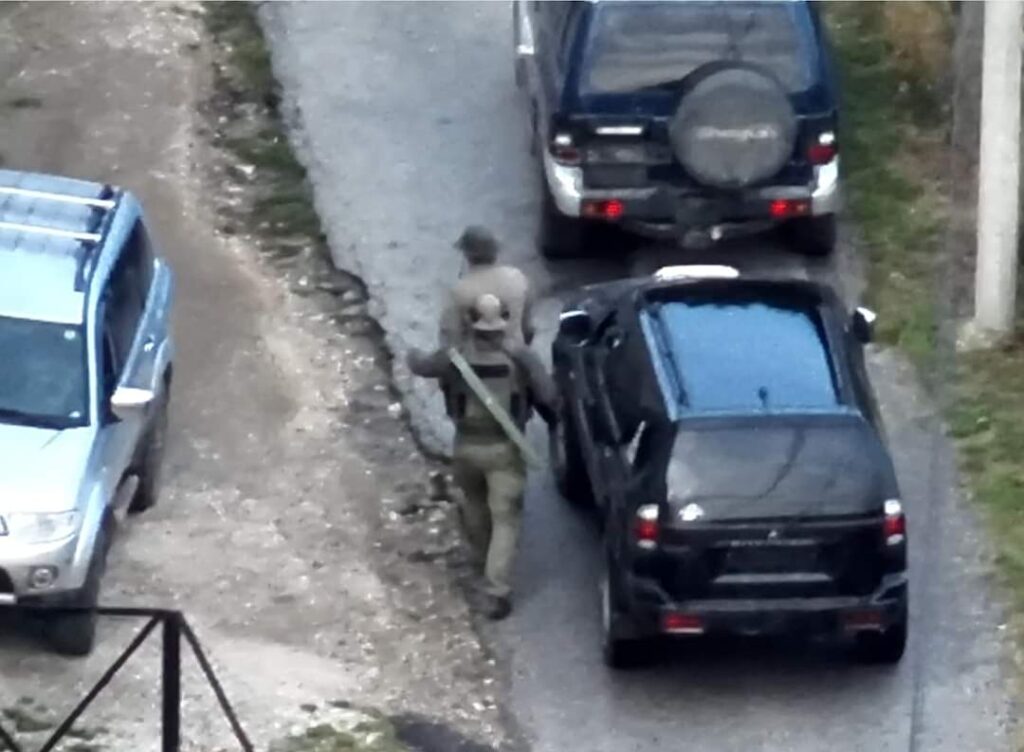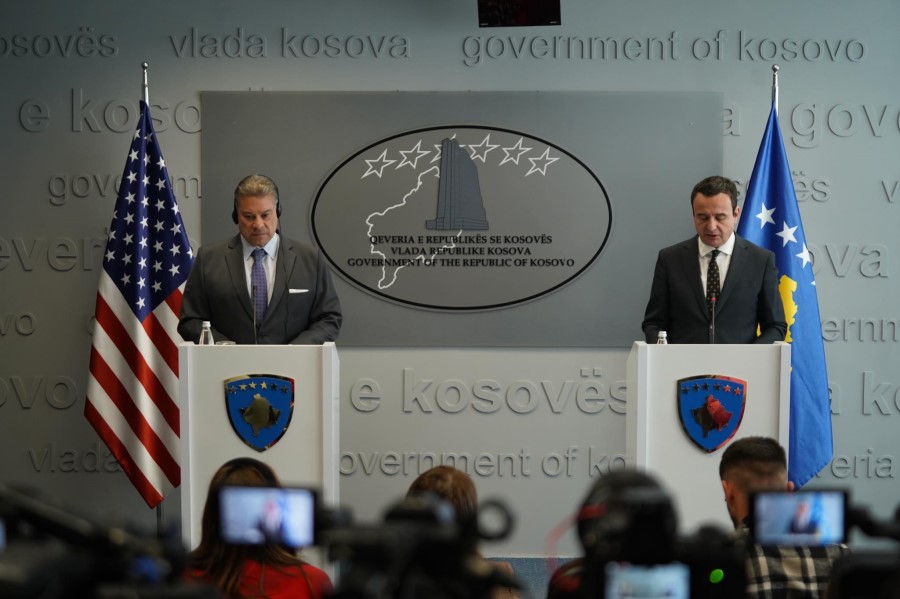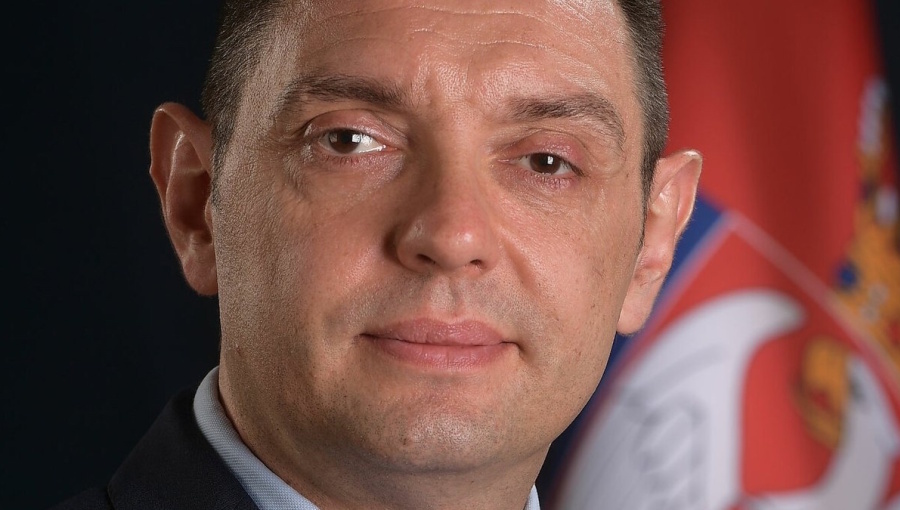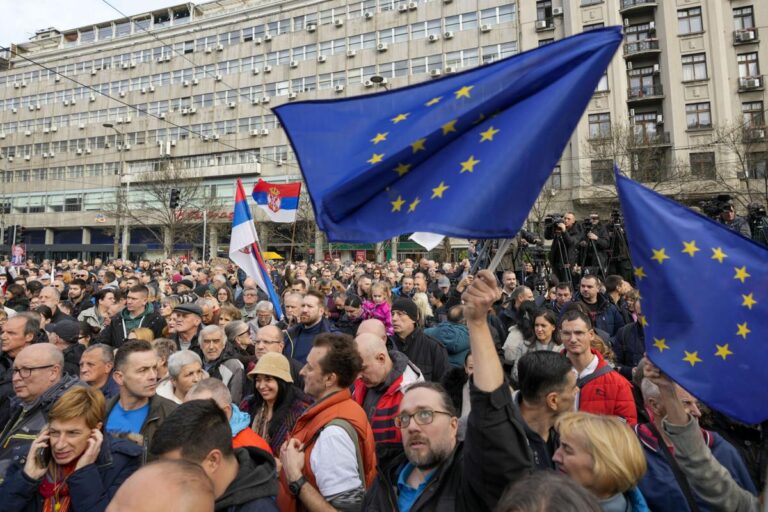The European Parliament will once again turn its attention to Serbia’s deepening political crisis during its session in Strasbourg from October 20–23. The debate will culminate in the adoption of a new 31-point resolution—arguably the most severe text ever directed toward an EU candidate country. The document highlights Serbia’s mounting polarization, intensifying repression, and democratic erosion under President Aleksandar Vučić’s rule. Earlier this year, the European Parliament held two debates on the situation in Serbia—focusing on the crackdown on civil society and the opposition—but neither resulted in concrete action.
The forthcoming resolution changes that trajectory. It proposes conditioning EU financial assistance on measurable progress in reforms and even contemplates suspending funds if Belgrade fails to meet key democratic benchmarks. Such measures illustrate a strategic recalibration within the EU’s approach to Serbia—moving from rhetorical criticism to tangible political pressure.
However, one omission stands out. Despite its severity, the resolution makes no mention of Milan Radojičić—the Serbian businessman and politician who admitted to organizing the Banjska terrorist attack in northern Kosovo on September 24, 2023. The attack, in which a Kosovo police officer was killed and several members of KFOR and the Kosovo Police were wounded, represented a direct assault on regional stability and US and EU-led peacekeeping efforts.
In its October 2023 resolution, the European Parliament had unequivocally condemned the Banjska attack, demanded accountability, and urged the European Council to follow the example of the United States by adopting targeted sanctions against Radojičić. Two years later, Radojičić remains free in Serbia, shielded from prosecution despite his public confession and well-documented criminal connections. The Belgrade court’s decision to reject the prosecutor’s appeal for his detention underscores Serbia’s systemic culture of impunity.
The absence of any reference to Radojičić or Banjska in the new resolution therefore raises critical questions about the EU’s coherence and political will. It signals either a tactical shift away from individual accountability toward a broader critique of Serbia’s authoritarian drift—or, more worryingly, a diplomatic reluctance to confront Vučić directly over state complicity in cross-border violence. Either way, the silence undermines the credibility of the EU’s rule-of-law conditionality and emboldens Belgrade’s defiance.
While ignoring Radojičić, the resolution places strong emphasis on Serbia’s internal repression. It condemns the intimidation of protesters and journalists, the misuse of surveillance technologies, and the growing concentration of power in Vučić’s hands. It also expresses concern over the re-emergence of nationalist narratives—notably the promotion of the “Serbian World” and “Greater Serbia” slogans—previously championed by government officials. Such rhetoric, the resolution warns, has no place in Serbia’s EU path and directly undermines regional peace.
The 31 points of the document cover a wide range of concerns: political persecution, election manipulation, state capture of the media, corruption in public procurement, and the systematic weakening of independent institutions. It calls for targeted EU sanctions against officials responsible for rights violations, supports an ad hoc EU mission to assess the situation on the ground, and demands that senior EU officials abandon “unfounded praise” for Vučić’s reforms. The text also links Serbia’s domestic instability to its external alignments—particularly its deepening energy and political ties with Russia.
Parallel to the European Parliament’s debate, Serbia faces escalating pressure from Washington. U.S. sanctions against the Oil Industry of Serbia (NIS)—a company with ownership ties to Russia’s Gazprom Neft—are set to take effect on October 1. The move, repeatedly postponed, reflects U.S. concerns that Serbia is enabling Moscow to circumvent Western sanctions and channel energy revenues into the war in Ukraine. Vučić has publicly acknowledged the impending sanctions, warning that they could have serious economic consequences.
The European Parliament’s latest resolution exposes the growing rift between Serbia’s proclaimed European ambitions and its authoritarian reality. Yet the document’s silence on Milan Radojičić and the Banjska attack represents a conspicuous act of political selectivity—one that risks diluting the EU’s moral authority in the Western Balkans. By avoiding the issue of cross-border terrorism, the EU inadvertently reinforces Belgrade’s narrative of denial and shields those who operate in the gray zone between state power and organized crime.
As Serbia edges closer to political isolation, the EU’s credibility will depend not on the number of resolutions it passes, but on its consistency in applying the principles it claims to defend. Unless Brussels is willing to confront impunity—both institutional and individual—its strategy toward Serbia will remain reactive rather than transformative. The silence over Radojičić is not just a diplomatic omission; it is a test of whether the European Union can still speak with authority in a region it once vowed to stabilize through justice and accountability.
Below are briefly described the 31 main points of the European Parliament Resolution on Serbia:
1. Recalls the tragedy of 1 November 2024 in Novi Sad, where 16 people lost their lives after a shelter collapsed at the railway station, and calls for a full, independent, and transparent investigation, prosecution of those responsible, and compensation for the families of the victims.
2. Supports the peaceful protests of Serbian students and citizens, condemning the polarizing rhetoric and anti-EU/pro-Russian propaganda spread by state officials and state-controlled media.
3. Condemns the violence, arbitrary arrests, and intimidation of journalists, demonstrators, and the opposition; calls for an end to illegal wiretapping and the use of surveillance devices such as Pegasus, as well as the violent suppression of protests.
4. Accuses the Serbian leadership of worsening repression, spreading conspiracy theories, and failing to provide an adequate institutional response.
5. Expresses concern about the abuse of criminal legislation to punish participants in peaceful protests.
6. Calls for the immediate release of activists arrested before the protests of 15 March and 28 June 2025, particularly members of the PSG who remain under house arrest or in exile.
7. Calls for urgent investigations into alleged violence by security forces against detainees, including torture, sexual humiliation, and physical abuse.
8. Notes the resignation of Prime Minister Miloš Vučević and the appointment of a new government under Đuro Macuta on 16 April 2025.
9. Notes the arrests and subsequent release of former ministers Tomislav Momirović and Goran Vesić for financial abuses in the Hungarian–Serbian railway project, and their alleged links to the Novi Sad collapse.
10. Condemns the punishment of education and culture workers for supporting the protests, including salary cuts, dismissals, and police interventions in educational institutions.
11. Demands the restoration of funding for universities and the guarantee of free participation of academics in EU programs.
12. Condemns the illegal camp set up in Pionirski Park by the ruling party and the involvement of individuals with criminal records in counter-protests.
13. Condemns the use of presidential pardons for persons involved in violence against protesters, describing this as direct interference with justice.
14. Calls for guarantees of security and reintegration for citizens who have fled the country due to political repression.
15. Condemns the detention and expulsion of EU citizens supporting the protests in Serbia, as well as the publication of their personal data by convicted war criminals.
16. Condemns the verbal attacks by senior Serbian officials against MEPs who participated in the protests or made public statements.
17. Condemns Russia’s interference in the protests in Serbia through disinformation and accusations of Western-backed “color revolutions”; calls on the Serbian government to halt the spread of such narratives.
18. Expresses concern about the Serbian government’s alleged negotiations with United Media aimed at weakening the influence of independent outlets such as N1, Nova, Danas, and Radar.
19. Calls for the full implementation of OSCE/ODIHR recommendations to guarantee free and fair elections, including the revision of the electoral list and the reform of the REM board.
20. Calls for a thorough technical and safety inspection of Serbia’s railway infrastructure, particularly along the Belgrade–Novi Sad–Hungarian border corridor.
21. Calls for increased transparency in public procurement and the protection of environmental standards, as well as the rights of local communities and minorities.
22. Encourages the European Commission to closely monitor the implementation of Serbia’s reform agenda and progress toward EU integration.
23. Reaffirms the EU’s commitment to Serbia’s European perspective, stressing that progress depends on respect for EU values and standards.
24. Stresses that progress in accession negotiations must be based on genuine reforms in fundamental areas such as the rule of law, media freedom, and the prosecution of corruption.
25. Expresses strong support for civil society, human rights defenders, and independent activists, calling for their protection and adequate funding.
26. Supports the deployment of an ad hoc EU mission to Serbia to closely assess the state of democracy and the ongoing protests.
27. Calls on senior European officials to refrain from giving unfounded praise for reforms in Serbia and welcomes the more realistic tone expressed by the President of the European Commission during her recent visit to Belgrade.
28. Calls on the European Commission to initiate targeted individual sanctions against those responsible for serious rights violations and breaches of the law in Serbia.
29. Calls on EU Member States to provide protection for persons at risk, including emergency visas and relocation programs, and to closely monitor judicial processes related to the protests.
30. Calls on the countries participating in EXPO 2027 in Serbia to take into account serious concerns about widespread corruption and the lack of construction standards in the EXPO project.
31. Requests that this resolution be sent to all relevant EU institutions, as well as to the state institutions of Serbia, the OSCE, and the Council of Europe.


More on this story: Serbia’s aggressive campaign to deny Kosova’s existence

More on this story: The US sanctioning of Vulin sparks demand for new political leadership in Serbia





